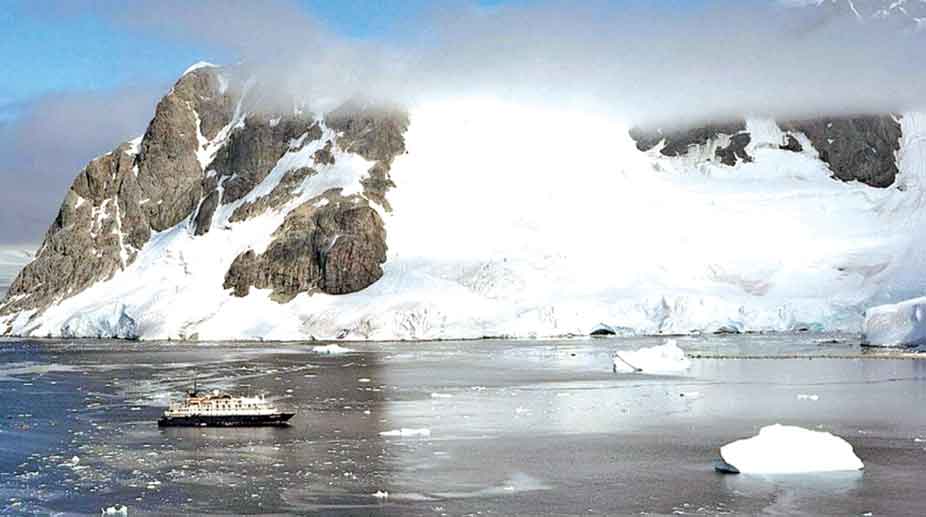My first morning in Antarctica, I awaken to a scene of sunrise-tinged icebergs. On the horizon, humpback whales are languorously moving dots in the pure ice-flecked water. Here at the end of the world, where our 100-passenger expedition ship Hebridean Sky is anchored, it is all splendour and silence. It is a contrast to the irongrey waves of the tumultuous Drake Passage that our ship had rolled on for two days, to get here from the tip of South America.
It takes a long time to reach isolated places, but a 48-hour trip is still, all things considered, reasonable. To put things in perspective, travellers often take a lifetime to arrive in a place as far and pricey as Antarctica, which is likely their seventh and final continent.
An adventure here sounds epic – yet it is very intimate when passengers on our 12-day summer voyage step onto little islands daily to watch penguin antics close up or camp overnight on the ice like the first explorers. Mr Lucas Blangero, 25, a strategy consultant from Paris on my trip, loves the perfection of Neko Harbour, an inlet on the Antarctic Peninsula with great icebergs and penguins everywhere.
He says the appeal of Antarctica is in the inner journey it sparks in each traveller when confronted with the unknown.
“It is a phantasmagorical place. It is mysterious,” he says. “It’s the perfect place to think about what to do in my life.”
Deep in the southern hemisphere, resplendent and hidden, the white continent of Antarctica is the epitome of far-flung places.
What is it about distant destinations, I wonder, that captures the imagination? Is it a desire to encounter a radical difference from all that is familiar? Or are we comforted when we encounter the same even in the most exotic locations?
A bit of both, really. In Kamchatka, in the Russian far east, I once snuggled in a tent on the cold tundra near reindeer herders. Living amid streams in the wilderness, they told me they disliked the sound of piped water in city apartments. Iran is a different story.
Politically isolated for 37 years before international sanctions were relaxed last year, it is more like the rest of the world than it is not, as I am delighted to discover. Young women sport tinted hair and nail art, and exuberant schoolgirls wield pink selfie sticks and say they love Korean dramas.
Secluded places, for me, also tend to be associated with extraordinary island clusters. Sometimes they do not have to be very far.
Take, for example, Indonesia, with its constellation of tens of thousands of islands that make the traveller feel like he is on the distant rim of the world. Komodo has its primordial dragons while Raja Ampat offers worldclass diving, including within a new manta ray sanctuary. So, sometimes, far-flung is a state of mind.
I remember two Generation Y colleagues who were anxious about living the less-plugged life in luxe resorts ensconced on Phuket in Thailand and private island Pangkor Laut in Malaysia, where they were assigned to write travelogues. In the end, the two city girls arrived at the same epiphany: They loved their escape, needed it and yearned for more in future. Perpetual Wi-Fi? They did not miss it, to their genuine surprise. “I forgot my need to connect to digital civilisation,” as one of them puts it.
Our minds yearn for a break from the sensory overload of smartphones and cities, whether we realise it or not. Immersed in natural beauty – such as the Milky Way hovering low over Lake Tekapo in New Zealand or the all-white world of Nagano in the Japanese winter – the senses are reawakened.
I imagine that humans are hardwired to relish time outside a city and, who knows, there is an ancestral longing to return to more open spaces – hopefully as far away as possible, though a nearby park that mimics the great outdoors does much for the psyche too. Several studies cited by The New York Times in 2015 show that walking in nature changes the brain.
Stanford University researchers, for instance, discovered that volunteers walking along green paths had less blood flow to the subgenual prefrontal cortex – a portion of the brain linked to the risk of mental illness. This brain zone was quieter, suggesting that nature lifts the mood.
My walks in wild places – Patagonia, Japan’s far north and, now, in Antarctica – have certainly soothed the spirit even when it was hard work to ascend a slope or when riding a horse on the edge of an abyss-induced anxiety.
“See how small you are next to the mountains,” British essayist Alain de Botton writes in his bestselling The Art Of Travel (2002). “Our lives are not the measure of all things: consider sublime places for a reminder of human insignificance and frailty.”
To be in sublime places is an ironically liberating reminder of human insignificance. In Antarctica, something as elemental as the light at sunrise, the sky and the horizon all look new to the traveller.
The Straits Times/ ANN






